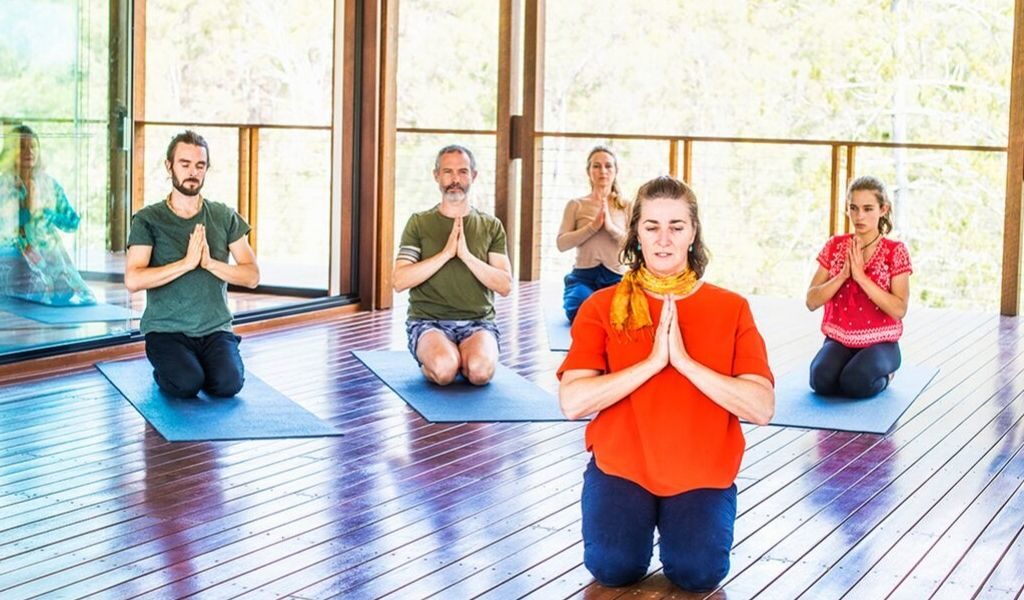About a year ago, I attended the fabulous Lifestyle Medicine Conference titled Brain and Biome. David Norris took some wonderful notes of the key note presentations at this conference and you will see some of his notes acknowledge below. These notes expand upon the topic Yoga as a Lifestyle Medicine – Yoga for developing gut instinct, understanding the gut brain axis and mental health – a topic which is covered in the beginnings of our 200hr yoga teacher training foundational weekends.
There is an emerging awareness that we must take care of our gut bugs. This is primarily done by choosing a diet rich in whole foods – eating a wide variety of organic foods, being mindful of the use of antibiotics, not only medicinally, but also in the food chain; this, in combination with yoga and meditation will support gut bugs influence on brain health.
In fact, Professor Felise Jackson firmly states that she believes that the first 12 months of life are critical for microbiome development. We should not only try and avoid antibiotics throughout our lifetime (and particularly in the antenatal period and early years for both Mother and Child), but also acknowledge their existence within the food chain and avoid food consumption that promotes their use.
In some countries, the total amount of antibiotics used in animals is 4 times larger than the amount used in humans. In many countries much of the antibiotics used in animals for growth promotion and prevention of disease, not to treat sick animals.
(World Health Organisation, 2017)
The importance of recognising the connection between your microbiome and your brain is outlined below
Antibiotics will not only affect your microbiome, but your brain.
Antibiotics were used in mice studies to wipe out all intestinal microbes in mice. The study showed that they performed poorly in memory tests, but that there was also a loss of new brain cells forming in a section of their hippocampus. The hippocampus normally produces cells throughout its lifetime (neurogenesis). However, this neurogenesis was reversible through exercising the mice on their wheels and administering probiotics. Interestingly though, feacal transplants did not restore the neurogenesis of the hippocampus.
Professor Zoltan Sarnayai studies Psychoneuroendocrinology, and the effects of stress on the microbiome, his work has shown that ongoing stress creates conditions that lower microbial diversity and encourage growth of inhospitable bacteria. This biome imbalance leads to issues throughout the whole body, it particularly affects the parts of the immune system located in the gut. Sarnayai’s work further suggests that chronic stress changes the brain’s neuro-structure, and below these are the structural changes he has discovered that stress has on the brain:
- Amygdala (emotional regulator)
- Hippocampus (short to long term memory consolidation)
- Prefrontal cortex (complex planning, personality expression, decision making and moderating social behaviour)
Additionally, Sarnayai has shown though his experimentation that in wiping out the gut flora in mice, the following neuro-biological brain changes occur:
- Hippocampus – stops functioning properly with impaired performance and affects the amygdala.
- Amygdala – when the hippocampus is structurally impaired its ability to influence the amygdala is reduced. The amygdala then becomes hyperactive and stimulates and abnormally high stress response.
- Prefrontal cortex -becomes hyper-myelinated
Interestingly, two of the mindfulness studies by Harvard Neuroscientist, Dr Sara Lazar, looked at the direct positive changes in the brain on these aforementioned areas (amongst others) with daily meditation for an 8 week period.
- The amygdala: “The amygdala, the fight or flight part of the brain which is important for anxiety, fear and stress in general. That area got smaller in the group that went through the mindfulness-based stress reduction program (within an 8 week period, on average for 27 minutes per day)”. The change in the amygdala was also correlated to a reduction in stress levels.”
- The prefrontal cortex: It’s well-documented that our cortex shrinks as we get older – it’s harder to figure things out and remember things. But in this one region of the prefrontal cortex, 50-year-old meditators had the same amount of gray matter as 25-year-olds.
- The hippocampus: The left hippocampus, which assists in learning, cognition, memory and emotional regulation.
The reduction in activity and size of the amygdala has a direct influence on the diversity of the microbiome. This is proven.
So besides meditation, what is proven to be helpful in promoting healthy change in both brain and biome?
- Take prebiotics (do your research first though)
- Take probiotics (maybe)
- Have a diet high in fibre
- Get a feacal matter transplant OR take CRAPSULES, or maybe just go swimming in a public pool (The two last recommendation’s only somewhat jokingly recommended by Feacal Matter transplant expert, Professor Thomas Borody)
- Relax and Move for brain and biome health – (By the way, yoga is found to be the best exercise for relaxation for women in the 25-40 age bracket in Australia. Yoga elicits the relaxation response and regulates inflammation, metabolism, HPA axis, and neurotransmitter / neuropeptide changes – each part being modified also by the gut microbiota in a bi-directional fashion)
- Get a dog, or some chicken’s
- Eat widely and organically
- Live on a farm or get outdoors as much as possible, get your hands in the dirt
- Avoid antibiotics in the food chain and animal products that are not organically produced
- Promote breast-feeding and vaginal birth where possible
- Early life exercise alters the microbiota, optimises brain health and metabolism so promote this 🙂
- Hang out with others – their biome is socially good for yours.
References and Additional Resources
Stress and How It Impacts Your Gut Microbiome
Gutsy Moves: The Amygdala as a Critical Node in Microbiota to Brain Signaling
Harvard neuroscientist: Meditation not only reduces stress, here’s how it changes your brain
Creating crapsules: is faeces in a pill the cure for our ills?
If you would like to contact Celia to learn more about the yoga teacher training journey, please do visit our Yoga Teacher Training Page or find us on Facebook or Instagram or contact Celia directly.


